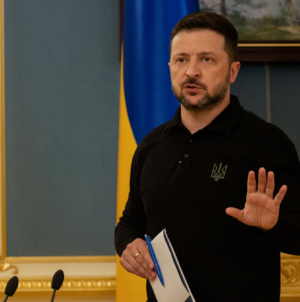-
Russia Says Zelensky Wants to ‘Torpedo’ Ukraine Peace Talks - 2 mins ago
-
Will Tariffs Spell the End of Detroit’s Resurgence? - 37 mins ago
-
Mahathir Mohamad, 99, Reflects on a Contentious Legacy - 40 mins ago
-
China Deploys Aircraft Carrier Group in Warning to US and Ally - about 1 hour ago
-
Hegseth Set Up Signal on a Computer in His Pentagon Office - about 1 hour ago
-
California Overtakes Japan to Become Fourth Largest Economy in World - 2 hours ago
-
Kyiv Hit by Deadly Airstrikes - 2 hours ago
-
NATO Fighter Jets Scrambled After Russian Long-Range Attacks - 2 hours ago
-
Ex-President Moon of South Korea Is Indicted on Bribery Charge - 3 hours ago
-
Trump’s Approval Rating Plummets With Nearly All Key Groups: Poll - 3 hours ago
Syrians Wake Up to a New Government
Syrians on Sunday were digesting the overnight announcement of a caretaker government that will be in power for the next five years, accepting with some resignation the continued dominance of the rebel group that seized power in December but welcoming its representation of the country’s main ethnic minorities.
The rebels who overthrew President Bashar al-Assad in December have since been acting as Syria’s de facto authorities, naming their leader, Ahmed al-Shara, interim president to oversee a transitional government.
Mr. al-Shara announced the much anticipated new government late on Saturday night, swearing in 23 cabinet ministers in a ceremony that ran into the early hours of Sunday — the last day of the fasting month of Ramadan before the Muslim festival of Eid al-Fitr.
The government appears to be a studied compromise between meeting calls for a more diverse cabinet that could unite the war-scarred and deeply divided country, while keeping Mr. al-Shara’s allies in the most powerful ministries.
Among Mr. al-Shara’s appointees are seven ministers affiliated with the provincial administration he once led in the rebel-held city of Idlib. But he also appointed nine independent ministers, among them technocrats and former activists, and included five ministers who served in the early years of the Assad regime before the country descended into civil war.
He named ministers from each of the main ethnic minorities, Kurds, Druze, Christians and Alawites, the sect of Mr. al-Assad. Among them was the lone woman minister, Hind Kabawat, who is Christian, to lead the Ministry of Social Affairs.
“No doubt some voices will feel excluded still,” Abdy Yeganeh, policy director at the Independent Diplomat, a London-based nonprofit advisory group, said ahead of the swearing-in ceremony. But overall, he said, “there is a sense of cautious optimism with the transition in Syria, including with the announcement of the new government.”
Mr. al-Shara had been under pressure from Western countries and from members of Syria’s civil society to form an inclusive government. Those calls took on greater urgency after sectarian violence erupted this month among Alawite communities in Syria’s coastal region.
“There is a need to widen the circle,” Ibrahim al-Assil, a senior fellow at the Middle East Institute in Washington, D.C., said ahead of the announcement, referring to Mr. al-Shara’s small circle of allies that had been running the transitional government since December. “There is a need to be more inclusive, from one perspective to reflect Syrian society, and from another because they need them. They cannot run the show on their own.”
Muhammad Haj Kadour contributed reporting from Damascus.






















